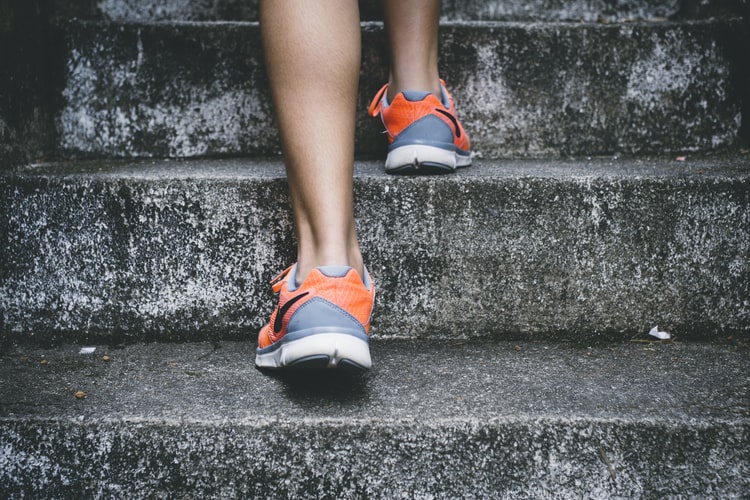Give Your Health a Make Over through Incidental Exercises
How much can small bits of activity really make a difference to your health? We investigated and found you can give your entire health a makeover.
Author:Karan EmeryReviewer:Stefano MclaughlinJan 09, 2021112.3K Shares2.5M Views

We're always advised that taking the stairs, not the elevator, or getting off the bus early will improve our wellbeing - but just how much difference will those little bits of action actually make? Keeping on the move with small bits of activity throughout the day can really help improve your health.
Reduce Cholesterol By Simply Taking The Stairs
One of the ways that cholesterol-lowering drugs work is to block production of an enzyme called PCSK9. But recent research from University of Geneva found climbing stairs cuts this naturally. In fact, when hospital employees were told to take the stairs instead of lifts for three months their levels of PCSK9 fell by nearly a fifth, and their levels of harmful LDL cholesterol fell too. As an added bonus, taking the stairs is also associated with significant energy burn. “Climbing five flights of stairs a day during the working week burns 1269kJ,” says researcher Dr. Lewis Halsey from the UK’s University of Roehampton.
Reduce Your Risk Of Having Breast Cancer By Doing Housework
Housework reduces the risk of breast cancer by 20 percent in post-menopausal women. Women doing 16 to 17 hours of housework a week reduced the risk by 30 percent. Housework includes walking the dog, shopping for groceries, gardening and playing with your kids.
Lower Blood Pressure By Reaching 10,000 Steps A Day
Walking the magic 10,000 steps a day figure has been shown to reduce blood pressure from an average of 149/98 to 139/90 in little as 12 weeks, shows research from Japan’s Wakayama Medical College. Measuring steps with a pedometer doubles the steps you’re likely to take, shows a University Western Sydney trial. But to power things up, walk everywhere as if you're just a little bit late for everything, faster walking gives the greatest health benefits. Picking music with fast beat and walking in time to it is an easy way to increase speed,” walking expert Diane Westaway.
Increase Your Vitamin D While Looking After Your Garden
Researchers looked at which activities best raised vitamin D levels. They found it was gardening. Dr. Marina De Rui from Italy’s University of Padova says, “We suspect it’s because gardening is such a regular pastime, it demands a certain regularity and can keep someone occupied for hours on a daily basis.”
Gardeners may be outdoors closer to the middle of the day than, say, walkers. Vitamin D is more effectively made when the sun is higher in the sky.
Be Thinner And Happier By Walking To Work
Researcher Adam Martin from the UK’s University of East Anglia has studied what happens when people walk, cycle or take public transport to work and he’s found that compared to drivers they are happier and less stressed, and find it easier to concentrate at work.
"You would think problems like service interruption or queues might trigger tension, but since busses and trains allow people time to rest, read and socialize, along with a stroll to the station or a bus stop, it seems cheerful," he says.
“People who take public transport are more likely to include some walking or cycling as part of their journey – from house to station, or between stations,” he says. “And while the biggest losses were seen in those who walked/cycled for at least 30 minutes, it all adds up.”
Live Longer By Walking To The Photocopier, Kitchen, Bathroom Upstairs
Researchers at University of Utah School of Medicine looked at which daily habits were associated with longevity. People who took short walks – about two minutes movement for every hour they were awake – lived the longest. Extra movement associated with a 33 per cent lower risk of death during the length of the trial.
Jump to
Reduce Cholesterol By Simply Taking The Stairs
Reduce Your Risk Of Having Breast Cancer By Doing Housework
Lower Blood Pressure By Reaching 10,000 Steps A Day
Increase Your Vitamin D While Looking After Your Garden
Be Thinner And Happier By Walking To Work
Live Longer By Walking To The Photocopier, Kitchen, Bathroom Upstairs

Karan Emery
Author
Karan Emery, an accomplished researcher and leader in health sciences, biotechnology, and pharmaceuticals, brings over two decades of experience to the table. Holding a Ph.D. in Pharmaceutical Sciences from Stanford University, Karan's credentials underscore her authority in the field.
With a track record of groundbreaking research and numerous peer-reviewed publications in prestigious journals, Karan's expertise is widely recognized in the scientific community.
Her writing style is characterized by its clarity and meticulous attention to detail, making complex scientific concepts accessible to a broad audience. Apart from her professional endeavors, Karan enjoys cooking, learning about different cultures and languages, watching documentaries, and visiting historical landmarks.
Committed to advancing knowledge and improving health outcomes, Karan Emery continues to make significant contributions to the fields of health, biotechnology, and pharmaceuticals.

Stefano Mclaughlin
Reviewer
Stefano Mclaughlin is a Psychologist focused on mental health, emotional well-being, and healthcare policy. He studied Psychology and Public Health at the University of Massachusetts Amherst, gaining a deep understanding of the intersection between mental health and public policy.
Stefano's mission is clear: he aims to destigmatize mental health discussions, improve access to mental healthcare, and promote emotional well-being for all. Drawing from personal experiences with anxiety and depression, Stefano shares real stories to make mental health topics more relatable and less intimidating.
In addition to his advocacy work, Stefano enjoys delving into books, experimenting in the kitchen, and embarking on new adventures. These hobbies fuel his creativity and inspire fresh perspectives for his advocacy work.
Latest Articles
Popular Articles
